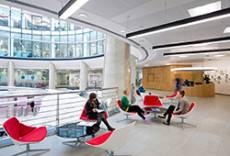May 14, 2014
HR and Facilities Management bodies to collaborate on future of workplace
 One of the main themes at the ThinkFM conference yesterday was the acknowledgement that facilities management and HR need to break down the silos that often exist between the two disciplines. This was the message of Chris Kane, CEO of BBC Commercial Properties, who explained that the British Institute of Facilities Management will be collaborating with the Chartered Institute of Personnel and Development on a number of projects to investigate how both communities of professionals are evolving and adapting to the changing workplace. It marked the end of a conference which began the day with a talk by Peter Cheese, the CEO of the CIPD, who remarked that both professions were in the business of getting the most of people in the working environment and why it is vital that those tasked with managing these key resources within organisations need to work together to maximise the value of its workforce. (more…)
One of the main themes at the ThinkFM conference yesterday was the acknowledgement that facilities management and HR need to break down the silos that often exist between the two disciplines. This was the message of Chris Kane, CEO of BBC Commercial Properties, who explained that the British Institute of Facilities Management will be collaborating with the Chartered Institute of Personnel and Development on a number of projects to investigate how both communities of professionals are evolving and adapting to the changing workplace. It marked the end of a conference which began the day with a talk by Peter Cheese, the CEO of the CIPD, who remarked that both professions were in the business of getting the most of people in the working environment and why it is vital that those tasked with managing these key resources within organisations need to work together to maximise the value of its workforce. (more…)

























May 14, 2014
Spending on office furniture becomes a US political football
by Mark Eltringham • Comment, Furniture, Public Sector, Workplace design
(more…)